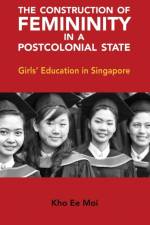av Ee Moi Kho
1 331
From the time Singapore gained self-government, both girls and boys have been given equal opportunities in education. This access to education has resulted in increased female literacy and improved social and economic status for women. However, in spite of this improvement, women s gender ideologies remain conservative and patriarchal. The school is an ideological apparatus of the state and this study examines how the education system has been used to influence the construction of femininity in school, thus maintaining the state s hegemony and preservation of a patriarchal framework in Singapore. It seeks to explore two questions: how the concept of femininity is constructed in the school curriculum and whether education for girls has empowered women or if it actually has entrapped them in subordination and maintenance of the patriarchal structure of society. In doing so, the author examines the gender ideology of the ruling elite through an analysis of its discourse on women and education. This will provide an understanding of the motivations behind policies such as equal educational opportunities for girls, and will highlight the primacy of pragmatic considerations of national economic advancement. At the same time, issues of subject choice and sex-differentiated curriculum as well as the embedding of gender ideology in curricular materials and school disciplinary codes are also examined in the light of how the concept of femininity is constructed in the school curriculum. A number of studies have focused on Singapore women s lives and careers, including their struggle to maintain coherence in their roles as career women on the one hand, and wives, and mothers on the other. What has not been examined is the school s role in the girls construction of femininity. The school, as the ideological apparatus of the state plays an important role in socializing girls to the norms, beliefs and value systems of the Singapore society. It is important to examine the state s gender ideologies and how such ideologies are transmitted via the education system. Gender messages are embedded in the formal and informal school curricula and these play an important part in children s construction of their gender identities. It has been assumed that because girls and boys are given equal opportunities in education, there are no important gender issues in the sphere of education. This book questions such an assumption and problematizes the role of education as a liberating force for women to investigate if education has indeed liberated women or entrapped them in subordination in a patriarchal society. This is the first comprehensive study of the impact of girls education on their construction of their gender identity. The author shows that women play an important but subordinate role in Singapore, be it in the economic, political or social sphere, and the government s support for equal opportunities for girls is based on pragmatic economic considerations and not on adherence to any dogma or theory. This gender ideology that is reflected in the education policies and curricula for schoolgirls emphasized patriarchal values and upheld traditional feminine virtues such as gentleness, docility and submissiveness. At the same time education and curricular policies encouraged girls to study the hard sciences, like the boys. All these have resulted in the construction of a dual role for women in both the economic and domestic spheres. The study also shows that for many years, education for girls had entrapped them in constructing a gender identity that upheld a patriarchal social structure. However, since the turn of the century, this construct has unraveled as the provision of modern education, especially in science and technology and the opportunities for employment have enabled women to become independent in many senses of the word, and this has brought about changes in society s gender ideology. The Construction of Femininity in a Postcolonial State: Girls Education in Singapore is an important book for any collection on gender and education. Educationists and the general public would find this study an enlightening read because it raises awareness about the importance of the role of education in the construction of gender identities.

